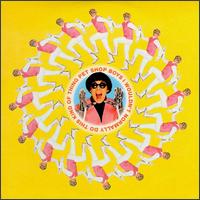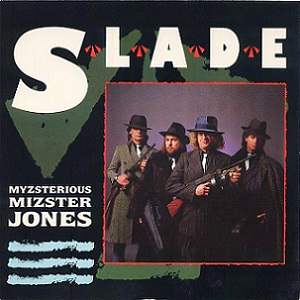The Armoury Show were a British new wave band, formed in 1983 and consisting of Richard Jobson on vocals, Russell Webb on bass guitar, John McGeoch on guitar and John Doyle on drums.

"Domino Dancing" is a song by English synth-pop duo Pet Shop Boys, released in September 1988 by Parlophone as the lead single from their third studio album, Introspective (1988). The song reached number seven on the UK Singles Chart and topped the charts in Finland and Spain. Its music video was directed by Eric Watson and filmed in Puerto Rico.

"Going Out" is the first single from English rock band Supergrass's second studio album, In It for the Money (1997). It was released on 26 February 1996, more than a year before the album, and reached five on the UK Singles Chart and number 20 on the Irish Singles Chart. The song was apparently originally written in the key of E because the engine of Supergrass' tour bus would tick at that same musical pitch.

"Can You Forgive Her?" is a song by English synth-pop duo Pet Shop Boys, released as the first single from their fifth studio album, Very (1993). The lyrics describe in the second person a young man's humiliation when his girlfriend accuses him of still being in love with a childhood friend; the woman is "not prepared to share you with a memory", and is "going to go and get herself a real man instead". The title of the song derives from the Anthony Trollope novel of the same name.

"I Wouldn't Normally Do This Kind of Thing" is a song by English synth-pop duo Pet Shop Boys from their fifth studio album, Very (1993). The song, both written and produced by the duo, describes a person normally hesitant to unwind and show his feelings, who—because of some event in his life—suddenly becomes willing to loosen up. It was released in the United Kingdom on 29 November 1993 by Parlophone as the album's third single, reaching number 13 on the UK Singles Chart. In the United States, where it was released in January 1994, it reached number two on the Billboard Hot Dance Club Play chart. The song's accompanying music video was directed by Howard Greenhalgh.

"Yesterday, When I Was Mad" is a song by English synth-pop duo Pet Shop Boys, released as the fifth and final single from their fifth studio album, Very (1993), on 29 August 1994 by Parlophone. The single, both written and produced by Neil Tennant and Chris Lowe, peaked at number 13 on the UK Singles Chart and number four on the US Billboard Hot Dance Club Play chart. The song was remixed by Jam & Spoon for its single release, among other things removing a compression effect applied to Tennant's voice during the verses. Its music video was directed by Howard Greenhalgh. One of the B-sides is a cover of the Noël Coward song "If Love Were All".

"Absolutely Fabulous" is a song by English synth-pop duo Pet Shop Boys, released by Parlophone and Spaghetti Records as a single for 1994's Comic Relief under the artist name "Absolutely Fabulous"; it is based on the BBC sitcom of the same name created by Jennifer Saunders and features sound bites taken from the first series of the show. The single peaked at number six on the UK Singles Chart and number seven on the US Billboard Hot Dance Club Play chart. It was more successful in Oceania, debuting and peaking at number two in both Australia and New Zealand; in the former country, it is the band's highest-charting single, and in both, it was their last top-10 entry.

"New York City Boy" is a song by English synth-pop duo Pet Shop Boys, released on 22 September 1999 as the second single from their seventh studio album, Nightlife (1999). In the UK, the single peaked at number 14 on the UK Singles Chart. It also reached the charts in numerous European countries, peaking at number three in Spain, and number four in Finland and Hungary. In the US, the song hit number one on the Billboard Hot Dance Club Play chart and number 53 on the Billboard Hot Singles Sales chart.

"Myzsterious Mizster Jones" is a song by English rock band Slade, released in 1985 as the third single from their twelfth studio album, Rogues Gallery. The song was written by lead vocalist Noddy Holder and bassist Jim Lea, and was produced by John Punter. "Myzsterious Mizster Jones" reached number 50 in the UK Singles Chart and remained in the top 100 for five weeks.

"Where the Streets Have No Name (I Can't Take My Eyes Off You)" is a song by English synth-pop duo Pet Shop Boys. The song is a medley of U2's "Where the Streets Have No Name" and "Can't Take My Eyes Off You", a 1967 song by Frankie Valli, though in an arrangement informed by the 1982 disco version of the song by the Boys Town Gang rather than the original. The song accompanied "How Can You Expect to Be Taken Seriously?", the third single from their fourth studio album, Behaviour (1990), as a double A-side in the United Kingdom (both singles were released separately in the United States). Released in March 1991 by Parlophone, the song became the duo's 15th consecutive top-20 entry in the UK, peaking at number four on the UK Singles Chart.

That's What Friends Are For is a song by English rock band Slade, released in 1987 as the second single from their fourteenth and final studio album, You Boyz Make Big Noize. It was written by lead vocalist Noddy Holder and bassist Jim Lea, and was produced by Roy Thomas Baker. "That's What Friends Are For" reached number 95 in the UK Singles Chart.

"Ginny, Ginny" is a song by English rock band Slade, released in 1979 as the lead single from their eighth studio album, Return to Base. It was written by lead vocalist Noddy Holder and bassist Jim Lea, and was produced by Slade. "Ginny, Ginny" failed to make an appearance in the UK Singles Chart.

"Burning in the Heat of Love" is a song by English rock band Slade, released in 1977 as a non-album single. It was written by lead vocalist Noddy Holder and bassist Jim Lea, and was produced by Chas Chandler. The song failed to make an appearance in the UK Singles Chart.

"Love in Anger" is a song by British new wave band The Armoury Show, released by Parlophone on 5 January 1987 as the lead single from the band's unreleased second and final studio album, Monkey Cry. The song was written by the Armoury Show and was produced by Howard Gray. "Love in Anger" peaked at number 63 in the UK Singles Chart.

"The Loser Gets to Win" is a song by English singer Kiki Dee, released on 14 October 1983 by EMI as a non-album single. The song was written by Dee, Harry Bogdanovs and Gary Osborne, and produced Elton John and Osborne.

"Nothing Matters" is a song by English band Robert Lloyd and the New Four Seasons. Written by Lloyd, Mark Tibenham and Dave Lowe, and produced by Tibenham, the song was originally released as a single on 17 October 1988 on the In Tape label and peaked at number 13 in the UK Independent Singles Chart. The song was re-recorded for Lloyd's debut solo album Me and My Mouth, released by Virgin in 1990, with Andy Richards as producer. The new version was released as the second and final single from the album on 23 April 1990.

"25 Years" is a song by Scottish pop band The Big Dish, released on 20 May 1991 as the third and final single from their third and final studio album, Satellites. The song was written by Steven Lindsay and was produced by the Big Dish. It reached number 87 in the UK Singles Chart.

"I Wanna Change the Score" is a song by English musician Tony Banks featuring English singer Nik Kershaw. It was released by Virgin on 7 May 1991 as the lead single from Banks's third solo studio album, Still. The song was written by Banks and Kershaw, and produced by Banks and Nick Davis. It reached number 76 in the UK Singles Chart.

Badman is the debut solo studio album from Scottish singer-songwriter Richard Jobson, released by Parlophone in November 1988.

"Glory of Love" is a song by British new wave band The Armoury Show, released by Parlophone in June 1985 as the third single from the band's debut studio album, Waiting for the Floods. The song was written by the Armoury Show and was produced by Nick Launay. "Glory of Love" peaked at number 92 in the UK Singles Chart.



















